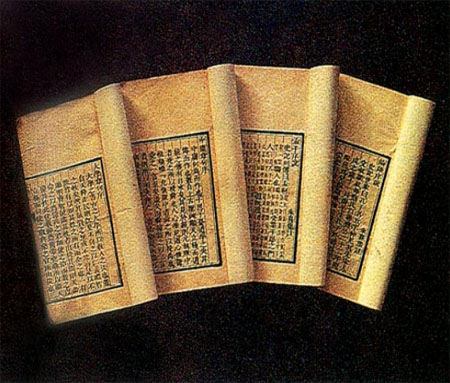
The Great Learning is the first of the Four books (or the Four Classics) which were selected by Zhu Xi in the Song Dynasty as a foundational introduction to Confucianism. It was originally one chapter in Li Ji (the Classic of Rites). The book consists of a short main text, attributed to Confucius and nine commentaries chapters by Zeng Zi, one of Confucius' disciples. Its importance is illustrated by Zeng Zi's foreword that this is the gateway of learning. The Great Learning is significant because it expresses many themes of Chinese philosophy and political thinking has therefore been extremely influential both in classical and modern Chinese thought.
The Doctrine of the Mean is one of the Four Books, part of the Confucian canonical scriptures. Like the Great Learning, it is now part of the Records of Rites. It is said to be a composition by Confucius' grandson Kong Ji, called Zisi. The purpose of this small, 23-chapter book is to demonstrate the usefulness of a golden way to gain perfect virtue. It focuses on the "way" that is prescribed by a heavenly mandate not only to the ruler but to everyone. To follow these heavenly instructions by learning and teaching will automatically result in a Confucian virtue. Because Heaven has laid down what is the way to perfect virtue, it is not that difficult to follow the steps of the holy rulers of old if one only knows what the right way is.
Analects, or Analects of Confucius, written in twenty chapters, is thought to be a composition of the late Spring and Autumn Period. It is undoubtedly the most influential text in East Asian intellectual history, collecting maxims and short discussions between Confucius and his disciples. Many of them take sense in a historically well-defined context. It is within this work that most of the basic framework regarding Confucian values such as humaneness, righteousness, filial piety, and propriety are uncovered.
The Mencius, commonly called the Mengzi, is a collection of anecdotes and conversations of the Confucian thinker Mencius. The work dates from the second half of the 4th century BC. It was ranked as a Confucian classic and its status was elevated in Song Dynasty. Zhu Xi, the scholar generally credited with the founding of Neo-Confucianism, included the Mengzi as one of the Four Books, and it became one of the canonical texts of Neo-Confucianism.